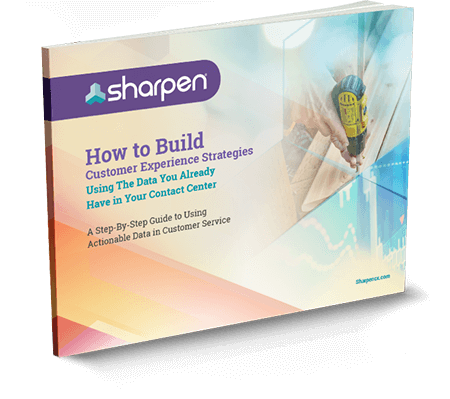
How to Coach Your Call Center Agents Into Excellent Customer Experiences In Every Interaction
Every profession needs good coaching. What were the Chicago Bulls without Phil Jackson? The New England Patriots without Bill Belichick? The UCONN Huskies without Geno Auriemma? The answer is nothing. Without great coaching, you don’t have a team. You have a collection of individuals.
As a manager, it’s up to you to coach your individual agents into a team that helps customers. It’s not an easy task. Each of your agents needs 1:1 coaching and each needs different care. You can’t use the same coaching techniques universally with your team. But don’t worry, I’ll walk you through everything you need to know to coach your agents into delivering a better customer experience.
The first step to coaching is to define your team’s goal. For the sports coaches I mentioned earlier, the goal was to win a championship. For you and your agents, the goal is to deliver an excellent customer experience. An outstanding customer experience is your Larry O’Brien Championship or Vince Lombardi trophy.
In a lot of ways, your job’s harder than that of any sports team. They play a full season, and a loss here and there is acceptable. For you and your agents, every day is a new season. You can’t take many losses. Every customer deserves your absolute best. (And when your team can’t deliver, it’s a loss for more than just your contact center team. It impacts the whole company.)
That’s not to say that you and your team won’t take an L here and there (it’s ok, we all do). But you have to figure out how to turn more of those L’s into W’s. The best way to do that is to “always be coaching”.
You can turn almost anything into a coaching moment for a better customer experience
Let’s say one of your agents is struggling. Maybe they’re too worried about missing efficiency metrics, so they rush customers off the phone. It’s frustrating (for you and them), but put that frustration aside and take a moment to scope the situation. Why is the agent struggling? Do they lack empathy for customers? Do they struggle to balance speed and quality like 63% of other agents? And, do they understand their performance expectations?
Address performance issues in your agent 1:1s
Avoid reprimanding agents in team meetings in front of their peers…it’s demoralizing. Instead, address performance issues in individual conversations with your team members. Here’s how.
Come to your 1:1 with three things to address with agents:
- The issue identified. It’s a core factor to talk about, but don’t make it the sole item you address in your 1:1.
- A few items of praise for the agent. Nobody wants to hear only what they did wrong. That too is demoralizing. Always mix in praise with constructive feedback. But don’t sandwich negative feedback in between the positive. This makes positive feedback feel ingenuine and negative feedback unhelpful.
- A support plan. Once you’ve identified the issue, figure out how to help your agent take action. Let’s use the above example of an agent struggling to connect with customers, rushing customers off the phone. A support plan might include emphasizing quality metrics over efficiency metrics so agents feel confident and comfortable helping customers solve their problems.
Talking to your agents about less-than-stellar performance won’t be fun or easy, but it’s your job as a coach to guide them through it. You owe it to your customers (and to your team).
Your 1:1s won’t always follow the above structure. With the right goals and performance management plan, your agents will crush it and you’ll spend most of their 1:1s trying to connect and learn more about each other. Those are the fun times as a coach.
[Read Next] 16 Practical Questions You Need to Ask Your Agents if You Want to Retain Employees
Outside of 1:1’s, the next biggest way you’ll communicate with your team is in your team meetings.
Team meetings are your practice before the big game
This is where your team comes together and learns. Learns about the company and how it’s doing. Learns metrics about the team and its performance. And, learns about each other.
As the coach, it’s up to you to decide the agenda for the team meeting. Come into each meeting ready with a timeline and talking points. This ensures you’re in control and leading your agents.
Here’s a sample agenda:
- Business updates. Touch on how the company as a whole is doing.
- Open the floor for initial questions. It’s important your agents understand what’s going on in the company.
- Team updates. Speak to how the team is performing. Are you crushing your metrics? Or do you have an area or two that need improvement?
- Team-building exercise. This can be a great way to build team chemistry and for you to connect with your agents.
- Give the floor to your team. Allow your agents to vent or ask questions. This is their time, allow them to speak freely.
Like 1:1’s, make sure you’re having team meetings regularly. You want your team to feel valued and to know how the company and your team are performing.
Next, learn different types of coaching that can improve the customer experience
The first is micro-learning. It’s a method of agent training that puts pre-created mini-lessons into your agent’s queue for quick and convenient review. Simply put, micro-learnings are short lessons that can be delivered frequently. And, studies show shorter training modules improve information retention by 20%. These bite-sized training modules help agents digest new concepts before their internal timer tells them to switch tasks.
[Read Next] What is Micro-Learning in Your Call Center? [Definition]
Add these lessons to your agent’s queues so they’re constantly learning how to improve for your customers. While quick, these lessons can make quite an impact. Target a specific objective with each lesson to unpack tough concepts in minutes (gone are the modules of yesteryear). These hyper-focused lessons keep agents engaged and allow them to quickly improve their Rolodex of knowledge, ensuring you manifest customer experience experts.
Second, let’s discuss in-line training. It’s contextual feedback managers (like you) deliver to customer service agents on their interactions. Being able to review customer interactions and call transcripts and leave feedback without using different documents or spreadsheets is amazing. And, it’s a huge time-saver for you and your team.
In-line training paired with microlearning allows you to craft learning and development around customer traffic, too. Leaving feedback for your agents allows them to review and learn when they have downtime. Meaning you don’t have to disrupt operations and workflow to deliver feedback or send a quick, 2-minute coaching lesson. Remember, with any training module, feedback should always center around the goal of delivering an excellent customer experience.
[Read Next] What is In-Line Training? [Definition]
And, make sure you define goals and map out objectives for your team
From the moment you hire and onboard an agent they should have a clear picture of their expectations. And, these goals and objectives should be driven by data.
As you know, data is the nucleus of the call center. It’s at the forefront of every decision thoughtful leaders make, and it should guide the customer experience. Use customer data to set performance standards for your agents. From there, you can identify KPIs that align with your goals and intended customer outcomes.
Your ultimate goal is to deliver an excellent customer experience. But under that umbrella, it’s paramount for your agents to have defined objectives and smaller goals, too. Plus, they need to be able to measure and track their success along the way. Using data to support goals and KPIs ensures your agents understand the “why” of what they’re doing.
According to Gallup, only 21% of employees feel like they have the performance management (i.e. feedback, access to analytics, and clear expectations) they need to do outstanding work. That’s unacceptable. Help raise the bar.
Coaching is about improving performance and helping your agents deliver an excellent customer experience. Focus on those two goals and you’ll lead a championship team that turns losses into wins. And remember, there’s more than one way to crack an egg, just like there’s more than one way to coach.


